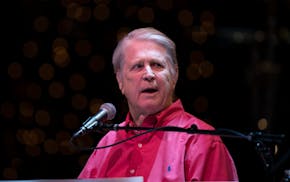For more than 25 years, "Lakeland News" has been serving Minnesota households from Little Falls to International Falls with stories that could otherwise get overlooked.
But the newscast, available in 400,000 households at 10 p.m. weeknights, might have to shut down if President Donald Trump gets his way.
"That kind of service could be in jeopardy," Lakeland PBS President Jeff Hanks said Friday, the day after Trump signed an executive order directing the Corporation for Public Broadcasting to end federal funding for National Public Radio and the Public Broadcasting Service. "Drastic cuts could be catastrophic for organizations like ours."
The Lakeland station, headquartered in Bemidji, relies on federal funding for 37% of its budget. That's fairly typical in smaller markets that largely serve rural residents. According to a recent study by Current, a nonprofit news organization that covers public media, some radio and TV stations depend on as much of 90% of their finances from the government.
Current estimates the average for station reliance on federal funding in Minnesota was 15% in 2023. Federal money contributed to 6% of Minnesota Public Radio's $120 million budget last year that covers a diverse number of entities that include a classical music station, podcasts and "Marketplace."
"I think larger PBS and NPR outlets like TPT and MPR might be more able to weather the loss of federal funding," said former KSTP-TV news director Kirk Varner, who now serves as editor of the industry newsletter tvnd.com. "I am concerned about the impact on the number of smaller stations like Lakeland PBS who do great work in their communities across our state and the nation."
But stations in larger markets might face a more daunting challenge than just having to tighten their belts.
"My feeling is that the entire system will collapse without that foundational federal support," said Jim Pagliarini, former president and CEO of Twin Cities Public Television. "Most of the local fundraising is motivated by [a] national programming schedule like 'Downton Abbey' and Ken Burns' specials. If that pipeline became restrictive, it would have a ripple effect."
Public media's future has been threatened before. But Congress has always agreed to keep allocating money to the CPB, as much as $535 million last year in taxpayer funds.
This time around, Trump is trying to terminate the relationship without congressional approval. It's unclear whether he can do that. CPB, established in 1967, is a private entity designed to be protected from government interference. Trump and his supporters have justified the order by claiming NPR and PBS engage in biased reporting.
"The difference this time around is that we really don't know what rules we are playing by," said Pagliarini, who retired in 2020 and now lives in Reno, Nev.
TPT executives declined interview requests, but did share a public statement.
"TPT is closely reviewing President Trump's executive order aimed at ending federal funding for PBS and NPR," it read. "As we assess its implications, we remain committed to our mission to deliver trusted public affairs information, enriching children's programming, lifesaving emergency alerts, and local storytelling that reflects and connects our communities."
Stations across the state are encouraging viewers and listeners to sign a petition being circulated by Protect My Public Media.
MPR has its own petition that it will send to Congress. As of Friday, the petition has gathered 25,000 signatures in five days.
MPR President Duchesne Drew worries that the caliber of his organization's programming, as well as its plans to invest even more in Minnesota, could suffer. He's particularly concerned about not getting as many contributions from smaller stations that enhance news coverage.
"We want to make sure people understand what's at stake here," Drew said. "This is a time where every penny matters."

Review: Pianist Bruce Liu delivers a spirited Prokofiev concerto with the Minnesota Orchestra

John Gorka, one of Minnesota's greatest folk singers, has a problem with Bob Dylan movie

Minnesota musician dads remember their kids' first concert

Our critic remembers musical genius Brian Wilson — and his Minnesota connections

